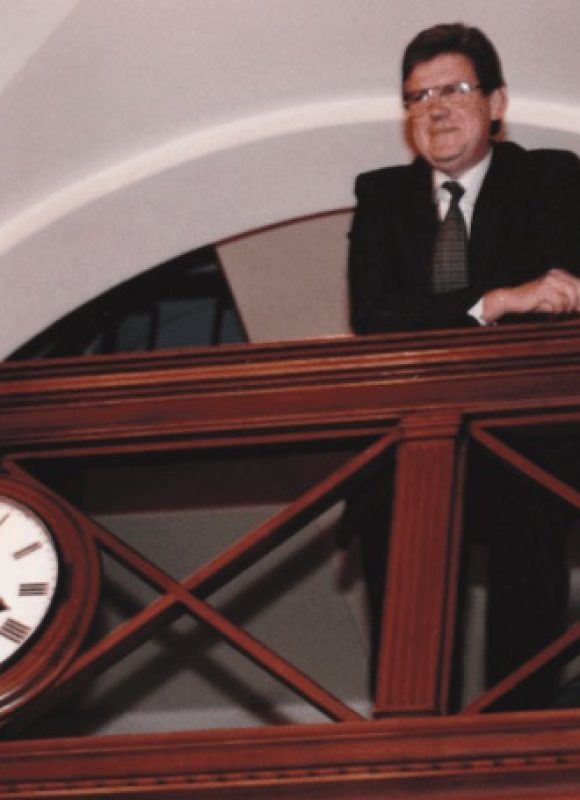PIONEER
Dr Leon Wessels

Lawyer | Negotiator | Constitution drafter
Born: 19 April 1946
“I believe the dream as it is couched in the Constitution is a dream that we should never lose sight of … the Constitution itself provides for the regular revision and discussion and debates about it, so the answer is … discuss the Constitution, talk about it through new eyes, through the eyes of our younger generations but … be fair and ask whether we are falling short when it comes to the delivery of the Constitution ideals …"
Who is
Dr Leon Wessels?
Lawyer, politician and ‘verligte’ (liberal) member of the National Party (NP) who served as the Deputy Chairperson of the Constitutional Assembly.
Professions
and Roles
Member of Parliament (MP) for Krugersdorp from 1977; Minister of Local Government, National Housing and Manpower.
Best Known For
Being the Deputy Chairperson of the Constitutional Assembly.
Life highlights
- Wessels studied Law at Potchefstroom University. He chaired the Potchefstroom Students’ Representative Council (SRC) and Afrikaner Studentebond (ASB) between 1971 and 1973.
- Wessels was elected MP for Krugersdorp in 1977.
- He acted as a Deputy Minister of Law and Order in 1988, and became a Cabinet Member under FW De Klerk’s Presidency in 1989, being appointed Minister of Local Government, National Housing and Manpower.
- Wessels was the first NP Parliament member who apologised for apartheid in June 1990. During the Truth and Reconciliation Commission (TRC), he said: “I do not believe the political defence of ‘I did not know’ is available to me because in many respects I believe I did not want to know.”
- Wessels became one of the NP’s negotiators during the Convention for a Democratic South Africa (CODESA) in 1991. He became Deputy Chair of the Constitutional Assembly in 1994.
- Wessels resigned from politics in 1996.
- Thereafter, Wessels studied at the University of Johannesburg, which was then known as Rand Afrikaans University where he got an LLM and LLD.
- He served as a commissioner in the SA Human Rights Commission (SAHRC) between 1999 and 2009, and was responsible for monitoring the Promotion of Access to Information Act (PAIA) to ensure transparency in government, business and civil society.
IN THEIR OWN WORDS
“I believe the dream as it is couched in the Constitution is a dream that we should never lose sight of … the Constitution itself provides for the regular revision and discussion and debates about it, so the answer is … discuss the Constitution, talk about it through new eyes, through the eyes of our younger generations but … be fair and ask whether we are falling short when it comes to the delivery of the Constitution ideals …
[Mandela] would have encouraged all of us as South Africans to return to the values as we crafted them in this South African Constitution – mainly to respect one another, to maintain dignity for one another, to work towards the interment for equality and to the progressive realisation of all the socio economic rights as we find them in the Constitution.”
– Leon Wessels
IN THE WORDS OF OTHERS
“First, he had always referred to Mandela as ‘Mr.’, an appellation that few Afrikaners prefixed his name with. Second, he had been generous in his assessment of Mandela. Third, he had not ruled out majority rule, subject to requisite checks and balances. He had not latched on to group rights, compulsory power-sharing or any of the shibboleths that were the ‘givens’ in NP circles at the time. Fourth, the fact that he stressed the importance of putting yourself in the other person’s shoes, coupled with his wanting to know what blacks were thinking and why for what appeared to be motives that were genuine and not for divining some counter strategic intervention impressed me, as did his emphasis on negotiations having to be non-adversarial. And fifth, he was the first person whom I had interviewed or would interview for some time who said the process was irreversible.”
– Paidraig O’Malley, Researcher
https://omalley.nelsonmandela.org/omalley/index.php/site/q/03lv01508/04lv01513/05lv01529.htm
